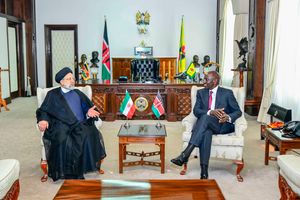Importers on edge as auctions loom on cargo tax, cash rules

Kenya Ports Authority MD William Ruto and another official during port stakeholders meeting with President William Ruto at the KPA new container terminal in Mombasa last week.
A fresh buildup of uncollected cargo has hit various ports of entry across the country as importers struggle to cope with consignment clearance rules by the Kenya Revenue Authority (KRA) and the Kenya Ports Authority (KPA) amid auction threats.
A spot check among traders revealed a slowdown in the collection of cargo as the two authorities implemented new rules on consolidated goods and cash payments at the port of Mombasa, respectively.
“There is an overall slowdown in the collection of cargo for various reasons one being the fact that KRA now unbundles consolidated cargo and invoices for individual items, which means importers are facing steeper chargers that put off some of them,” Mr Peter Kanyoru, an importer told Smart Business.
“There is also the development where KPA has shifted to cash payment for services at the port, which is affecting many importers who may not have ready cash for payment,” he noted.
KRA now bills individual items on consolidated shipments of cargo—a shift from the past when taxes on such items were invoiced per kilogramme, creating an opportunity for tax invaders to ship in costly items.
Importers of consolidated cargo have been paying KRA Sh200 per kilogramme for air cargo or Sh2.2 million for a 40-foot container brought in through the sea. The consolidators turn charged traders Sh996.76 ($7) for a kilogramme of cargo transported through the air and Sh711.97 ($5) for goods shipped in.
KRA's position is, however, affecting many importers who are unable to afford the higher tax invoices leading to a pile-up of cargo even as the taxman warned of auctions.
“Due to congestion of goods currently being witnessed at various ports of entry across the country, Kenya Revenue Authority wishes to notify all affected importers and owners of such goods to immediately remove them failure to which KRA will have no option but to advertise for the sale of the goods via online public auctions in line with provisions relating to auctioning of goods under Customs Control under Section 42 of the East African Community Customs Management Act 2004 and Regulation 207 of the East Africa Community Customs Management Regulations 2010,” KRA said in a notice last week.
Apart from the authority purge on consolidated cargo, a new directive by KPA on cash terms at the Port of Mombasa has also rattled importers amid concerns of fresh congestion as cash-strapped traders struggled to move their consignments.
KPA from July 1, 2023, stopped rendering services on credit terms and suspended payments through ledger guarantee accounts.
KPA Managing Director William Ruto during a stakeholders meeting in June announced that the State agency will only render services through bank cheques and other bank payment systems including real-time gross settlement (RTGS) adding that all customers with guaranteed ledger accounts would automatically convert to cheque deposits beginning July 1.
"To streamline and improve operational efficiency, KPA will cease to render port services on a credit basis from July 1, 2023; essentially halting the six-day credit period arrangement that has traditionally been extended to customers," he said when he addressed a stakeholder engagement session with the Kenya Ships Agents Association.
As part of the changes, KPA said all export cargo will no longer be logged into the Integrated Customs Management System (iCMS) and Kilindini Waterfront Automated Terminal Operations Systems (KWATOS) for export clearance.
The new rules require exporters to be first logged into the systems at the time of acceptance and their approval declared.
"In a bid to enhance service delivery and improve the customer experience at the Port of Mombasa with effect 3rd July 2023, all export cargo brought to the port for shipment must have relevant online approved permits on Kenya Trade Network Agency (Kentrade) portal. Non-compliant cargo will not be accepted into the port," read a joint notice by KPA and KRA.
Closure of acceptance period for export cargo into port strictly closes 24 hours before berthing of booked vessel.
In February this year, KPA moved its cargo handling services to the government portal e-Citizen to comply with the current administration’s target of going paperless in its transactions.
The squeeze of the new rules by KRA and KPA has left many traders on the edge amid fears of loss of their cargo through auctions.
“The economic situation is tough at the moment and it is not easy either to raise the extra cash demanded for consolidated cargo or the upfront cash demands imposed by KPA for services,” Mr Kanyoru lamented.
“This explains why we are witnessing a fresh pileup of cargo that may end up being auctioned at some point. You notice KRA has already issued a 21-day notice for collection of cargo or have them auctioned,” he added.
KRA has since last year stepped up the sale of cargo at various ports of entry including the Mombasa port and the Jomo Kenyatta International Airport (JKIA) in a bid to maximise revenue collections.
For example, the taxman in November last year listed an estimated 443 vehicles for auction after their owners failed to pay taxes and other charges
A review of the auction list also revealed a large number of other popular Toyota brand models including Probox, Succeed, Passo, Fielder and Toyota Hiace. The list was also dominated by Nissan Note, Honda Fit, Mazda Demio, Toyota Harrier and Subaru Forrester.
KRA also sold a large number of personal effects seized from Kenyans re-entering the country through JKIA as it stepped up its purge on tax evasion.
Personal effects such as clothing, footwear, handbags, paintings, human hair extensions, and wigs, earrings have dominated a list of confiscated items set to be auctioned next month at the airport’s customs warehouses an indication of the high rate of failure to comply with reporting requirements.
The taxman in 2016 set the maximum duty collected on personal effects at Sh50,000 in a bid to speed up clearance of passengers at international airports and listed the items to be subjected to customs taxes at the arrival and departure terminals.
Under the guidelines, all taxable items attract levies at rates determined by the value of money paid in a foreign country rather than factors such as quality, size, or weight, the guidelines state.
The rules came in the wake of complaints lodged by passengers arriving at JKIA from Dubai and China, who said they were always subjected to extortionist rates, unlike their counterparts from America and Europe.
Currently, passengers departing from Kenya are required to fill in a Temporary Importation Form-P45- to declare items being shipped overseas for repair and the accompanying tools and show the receipt during return as a declaration.
Also, items bought and carried for business promotional and commercial purposes need to be declared during departure for purposes of taxes on return. Electronics like phones, video recorders, and projectors bought while on a trip to Kenya and currency exceeding Sh1.42 million ($10,000) must also be declared at customs before departure.
Passengers arriving in Kenya are also required to fill passenger declaration form stating the amount paid for each item including the taxes. Items intended for sale or for use in a business including those being brought back to Kenya after they are used commercially must be declared too.
At the arrival desk, a traveller is expected to declare newly acquired items whether they were bought, inherited, or gifted and any other items bought exceeding the limits of duty-free shops.
“Duty-free shop articles sold in a customs duty-free shop are free only for the countries in which that shop is located.
Therefore, if your acquired articles exceed your exemption and allowance, the articles you purchased in a customs duty-free shop, whether in Kenya or abroad, will be subject to customs duty upon entering your destination country,” said KRA.
Donations are also not exempt from taxes unless in situations where a Pro 1B document (mostly accompanying diplomatic goods) and a special letter from the Treasury are produced.





